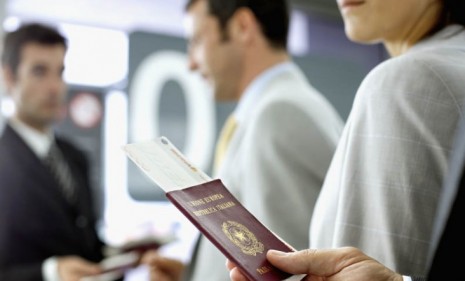The fastest way to board an airplane
American Airlines' new "random" boarding strategy: Is it passenger-friendly or "complete chaos"?

A free daily email with the biggest news stories of the day – and the best features from TheWeek.com
You are now subscribed
Your newsletter sign-up was successful
Airlines have devised a number of ruthless cost-cutting strategies, from surcharges for extra bags to "standing seats" that force passengers to lean into a saddle-like chair. (Following a storm of complaints, that last idea never got off the ground.) The latest innovation, from American Airlines, is more about speed than cost, however. American has decided that boarding passengers in a random fashion is faster than its former policy of boarding passengers sitting in the back of the plane first, before those in the front. Here, a guide to this new seating scheme:
How does random boarding work?
Economy passengers are assigned to boarding groups based on their check-in time, not their seat position, so when it's time to board, those who checked in earlier board first regardless of where they're sitting. This alleviates gridlock: "You definitely will not have 24 people in four rows boarding [and jockeying for overhead bin space] at the same time," says Scott Santoro, director of airport consulting for American Airlines, quoted by the Los Angeles Times.
The Week
Escape your echo chamber. Get the facts behind the news, plus analysis from multiple perspectives.

Sign up for The Week's Free Newsletters
From our morning news briefing to a weekly Good News Newsletter, get the best of The Week delivered directly to your inbox.
From our morning news briefing to a weekly Good News Newsletter, get the best of The Week delivered directly to your inbox.
How successful is this new boarding policy?
Significantly, if not dramatically. American Airlines, which recently implemented the boarding policy after a two-year study, claims that it shaves three to four minutes off the typical boarding time of 20 to 25 minutes. And some passengers have noticed that planes are leaving the gate more quickly: "Boarding was pretty quick," says Rebecca Mallett in Bizmology.
Is everyone happy with this strategy?
No. The Association of Professional Flight Attendants has slammed the new boarding process. "More often than not, the result is congested aisles and flight attendants having to explain to bewildered and already stressed passengers why there is complete chaos in the cabin," according to the group's website. Note that flight attendants' pay doesn't begin until after boarding has concluded — from their point of view, the less they have to manage the process, the better.
A free daily email with the biggest news stories of the day – and the best features from TheWeek.com
Can the system be gamed?
Of course. Pre-printing boarding passes and checking in with a smartphone well before the flight improves your chances of getting assigned to an earlier boarding group. American's "Express Seating" option, which gets you into the first boarding group and a seat at the front of the plane, is available for an extra fee. As always, premium flyers (first and business class, etc.) always board before economy flyers.
What are other airlines doing?
Paying close attention. Though a few other airlines, like Southwest, already have a similar first-come, first-seated seating policy, if American's strategy succeeds, expect to see random boarding spread throughout the industry. Other airlines have adopted a "window-to-aisle" boarding strategy, which American's research also found time-saving, but not as swift as their new random-seating process.
Sources: Bizmology, Los Angeles Times, Telegraph, USA Today, Wall Street Journal
-
 Quentin Deranque: a student’s death energizes the French far right
Quentin Deranque: a student’s death energizes the French far rightIN THE SPOTLIGHT Reactions to the violent killing of an ultra-conservative activist offer a glimpse at the culture wars roiling France ahead of next year’s elections.
-
 Secured vs. unsecured loans: how do they differ and which is better?
Secured vs. unsecured loans: how do they differ and which is better?the explainer They are distinguished by the level of risk and the inclusion of collateral
-
 ‘States that set ambitious climate targets are already feeling the tension’
‘States that set ambitious climate targets are already feeling the tension’Instant Opinion Opinion, comment and editorials of the day